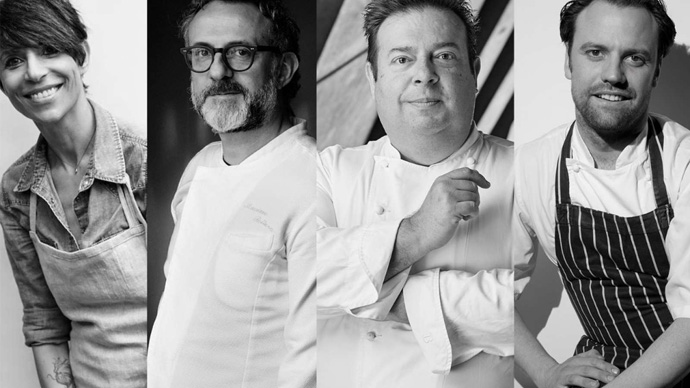Australians love their food, and today was no exception. Today’s event #50BestTalks held at the Sydney Opera House was very well attended. It seems people don’t only like to eat food but they also like to talk about it too. Today we heard the views of the world’s culinary geniuses, the ‘Roger Federers in the kitchen, the brightest stars in the constellation as today’s host, political journalist, Annabel Crabb described it. Massimo Bottura, Peter Gilmore, Brett Graham & Dominique Crenn are the people every person’s eyes were focussed on for a full 90 minutes today, who shared their insights and food stories with us on how they got to where they did, how they were influenced in their careers, how they go about their creative processes, gender issues in the restaurant industry and finally an audience question and answer where the topic of sustainability appears to have dominated that segment. It was excellent panel discussion which was moderated by Annabel extremely well, and an event that got me curious and listening to every word that was said, inspired, with many funny moments where I chuckled.
 |
| Image courtesy of the Sydney Opera House |
Almost 200 top international food and wine influencers – including chefs, restaurateurs, winemakers, sommeliers and media arrive in Australia ahead of The World’s 50 Best Restaurants awards. The week-long official program, which runs from 1-8 April, involves the annual awards ceremony and numerous other events and is followed by a country-wide tour for 100 of the visiting chefs and media to take in some of Australia’s best food and wine experiences. “The World’s 50 Best Restaurants provides the perfect platform to ensure this impressive gathering of influential food and wine figures leave our country as lifelong advocates,” said Tourism Australia Managing Director John O’Sullivan.
One of the funniest moments during the talk today at the Sydney Opera House was when Peter Gilmore of Quay and Bennelong Restaurant, arranged a dish for the other chef panelists to try using Gilmore’s favourite ingredients. Gilmore said “These are our canapes at Bennelong Restaurant … Australian classics of yabbies that are typically caught from the dams and boiled in billies, and the pikelets my mum use to make. Put them together with jam and cultured cream and eat it.” Dominique Crenn got up, whipped out her phone and said “Let me take a picture first”. The audience laughed and she pops it into her mouth “I give you a 10”. Dominique then adds “The reason why this dish is a success is there is familiarity when you eat it, it touches people, it feels like eating crepe to me. People like being touched with childhood memories.”
Dominique Crenn, a French chef best known for gaining two Michelin stars for her restaurant, Atelier Crenn, in San Francisco, California, United States and awarded the Best Female Chef in 2016 by world’s 50 Best Restaurant awards, said to us that every person she meets in life becomes part of her DNA which she said is very important because, emotionally you become a better person. Her presence on stage probably resonated with me the most because there were two occasions where gender in the kitchen was brought up where she questions why do we make the distinction between females and males in conversation and focus on the “choices females have to make when it comes to career and family”? In her view the conversation needs to be reframed not being one of “if you’re male or female in the hospitality industry” because whether you are male or female we all have to make choices in life and using gender to frame the discussion is not the right starting point. Her response received an applause from the audience including me.
Peter Gilmore, Executive Chef of Quay, which has been included in The World’s 50 Best Restaurants since 2009 spoke about how he got to where he did. “Chefs are divided into 2 categories” he says. “Parents are good cooks or they are bad cooks and lucky for me I fell in the former. Mum was an excellent cook and loved entertaining. When I was 12 years old I wanted to cook. When Dad burnt the steaks I took over and it’s good to do something where people enjoy what you have done.”
Annabel then asked about the chefs’ influencers, movement, and mentors and asked “how difficult was it to find something individual to you?”.
Massimo Bottura, an Italian restaurateur and the chef patron of Osteria Francescana, a three-Michelin-star restaurant based in Modena, Italy which has been listed in the top 5 at The World’s 50 Best Restaurant Awards since 2010 and in June 2016 Osteria Francescana is No. 1 in The World’s 50 Best Restaurants 2016, spoke about his mentors and how important they were in influencing his work.
Bottura talked about his growing up and the palate that developed at home and through his travels. The turning point in his career and the person who influenced him the most was meeting Alain Ducasse in 1993 where the feted French chef had visited Campazzo Bottura’s restaurant back then and Ducasse was interested in what Bottura was doing. Bottura said he kept it simple and Ducasse was coming into the kitchen and said that he would love Bottura to work with him France. Bottura said “I’m leaving everything and coming with you.” Bottura had an incredible experience with Ducasse. Bottura mentioned how he kept an epic notebook and wrote everything he learnt and every recipe down until Ducasse one day ripped his notes to shreds and threw it out and told him Bottura needed to stand on his own feet and walk and it was too easy to copy a recipe. Bottura from then on learnt that you have to express yourself in the culinary arts in your own way and don’t copy. Do your own expression.
Bottura reinterpreted Italian classics and found it difficult to change the community of old traditions. His wife taught him how to look at contemporary art. Bottura also started to do something different to Parmiaganno cheese and everyone thought he was ruining the image of cheese. 20 years later, it’s now the signature plate of Italy for gastronomy. His message to us was that if it’s a good idea, it’s normally recognised after the event, so be strong, believe in yourself and just do it.
Dominique Crenn was then asked how she knew something was a good idea. She said you never know it’s a good idea. You have to know yourself, have a vision and have confidence. When you serve a dish what story does it tell and advises against doing dishes that don’t make sense and don’t copy a dish from someone else. She said if you really want to be a chef you need to have your own story and “if not, what are you doing?”, Dominique says.
For Dominique, the story and its meaning comes first and the ingredients come later, but recognises seasonality is important. “Bring your own DNA to your dishes. You have to be confident and believe in yourself and don’t let people let you know you are not good enough” Dominique says. I discovered that Dominique’s menus are written as a poem, like a story. She says, “Words matter. Food is language and it’s just as important to put them in words.”
Gilmore discussed his creative process, and said he is an “ingredients first” person. He likes the process of gardening and growing vegetables and sees it as a miracle when you put seeds in ground and see the next generation of plants sprout up. Gilmore also doesn’t look at what other people do and cooks the way he wants to. Sure you need to learn technique but it also takes long time to create your own style. Gilmore’s advice is, “Find what speaks to you”. For Gilmore, what speaks to him is the produce, texture, technique and balance.
Brett Graham, who helms The Ledbury in London, and the highest ranked Australian chef in The World’s 50 Best Restaurants spoke about this creative process says it’s a team work of the kitchen and a journey to get a dish finished. Also he places a high importance on what customers want and one thing he benchmarks is “whether a woman would like to eat this?”
When it came to the audience Q&A, sustainability was a topic discussed and one small restaurant operator asked how to balance sustainability, being financially viable and keeping customers happy. Gilmore responsed by saying you need to think where you are buying ingredients, understand organic produce or the use of organic practices, and put in extra effort in understanding things that are ethically produced. Think about the way you use scraps and a way to use all parts of the animal. Cook with in season produce and no point in using wild asparagus flown in half way around the world from Peru in the wrong season. Use vegetables that are available that are reasonably priced. You need to think before cooking.
Bottura also said these days it’s about a complete experience in the restaurant. “If the food is good but service is bad, people will never go back. If the food is so, so but the service is good, people will go back”. There is a focus on service in Europe and the need for front office staff to explain to customers what’s going on in the kitchen.
There were clearly some valuable insights from today’s #50BestTalks from these culinary geniuses that could provide useful pointers not only for those who are looking to embark on a career in hospitality but anyone who are seeking a creative path to success.









